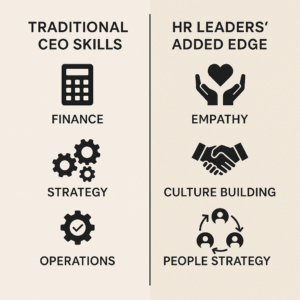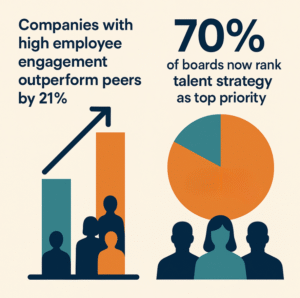A Shift in the Corner Office
For decades, the traditional path to becoming a CEO has run through finance, operations, or corporate strategy. Leadership was often measured in numbers – quarterly earnings, cost efficiency, or market share growth. HR, meanwhile, was relegated to a “support function,” seen as necessary but not central to the company’s future.
That perception is being upended. As workforce dynamics evolve faster than ever before, driven by hybrid work, automation, and global talent competition, companies are realising that business strategy is inseparable from people strategy. It’s no surprise, then, that more HR leaders are making their way to the corner office.
Why HR Leaders Have the Edge
Modern HR leaders are no longer focused only on hiring, compliance, or payroll. They’ve been at the heart of some of the biggest business challenges of the past decade: from managing mass layoffs and pandemic-era disruptions to tackling diversity, equity, and inclusion at scale. In the process, they’ve learned to balance empathy with economics.
Unlike traditional executives who may view talent as a line item, HR leaders see it as a long-term investment. They understand that employee engagement, culture, and leadership pipelines have a direct impact on performance. As a result, they bring a holistic perspective that blends financial sustainability with human capital growth.

Case Studies that Changed the Narrative
Take Leena Nair, for instance. After decades at Unilever shaping leadership and talent development, she became CEO of Chanel, an unusual move for the luxury sector, but one that underscored the company’s commitment to people-driven leadership. Similarly, Mary Barra, who once headed HR at General Motors, has led the company into the electric vehicle era, proving that people-first leaders can deliver on technological and operational transformation.
Other examples include Anne Mulcahy at Xerox, who guided the company through its near-collapse, and Steve Cannon at Mercedes-Benz USA, whose HR grounding gave him an unmatched ability to connect with employees and customers alike. Each case reinforces the idea that understanding people can be as influential as understanding numbers.
Beyond Soft Skills
Critics often argue that CEOs must excel at financial engineering or geopolitical risk skills that HR leaders may lack. However, this view underestimates the extent to which the HR role has evolved. Today’s CHROs:
- Oversee billion-dollar budgets and payrolls.
- Shape global policies across dozens of legal jurisdictions.
- Work closely with CFOs, COOs, and boards on restructuring, mergers and acquisitions (M&A), and succession planning.
In short, they already operate in the same complex, high-stakes environment as traditional CEO pipelines. The difference lies in their ability to put people at the centre of every decision.
Why Now?
The timing is no coincidence. In today’s economy, talent is the ultimate differentiator. Technology and capital can be replicated; culture and people cannot. A Gallup study reveals that companies with engaged employees outperform their peers by 21% in profitability, while McKinsey has found that diverse leadership teams are significantly more likely to succeed.
Culture has become a financial metric in its own right. A disengaged workforce eats into productivity, while a motivated one fuels growth and innovation. HR leaders, having managed both crises and culture, are uniquely positioned to deliver this edge.

Redefining the CEO Playbook
This doesn’t mean that CFOs or COOs worldwide are losing relevance. Instead, the definition of leadership is broadening. The CEO of the future will need to blend:
- The financial discipline of a CFO.
- The operational mindset of a COO.
- The human-centric vision of a CHRO.
By bringing HR leaders into the fold, companies are acknowledging a fundamental truth: businesses run on people, not just numbers.
Contributor: Team Leveraged Growth



